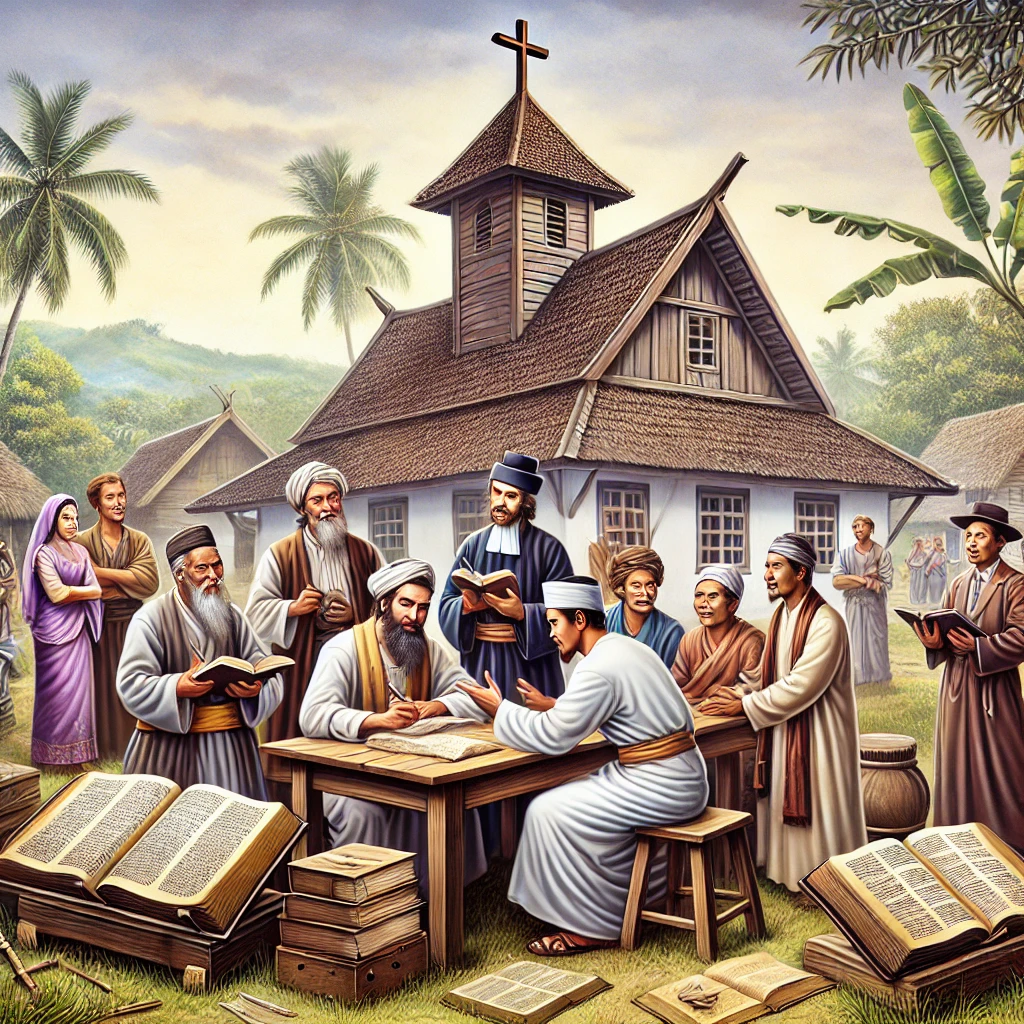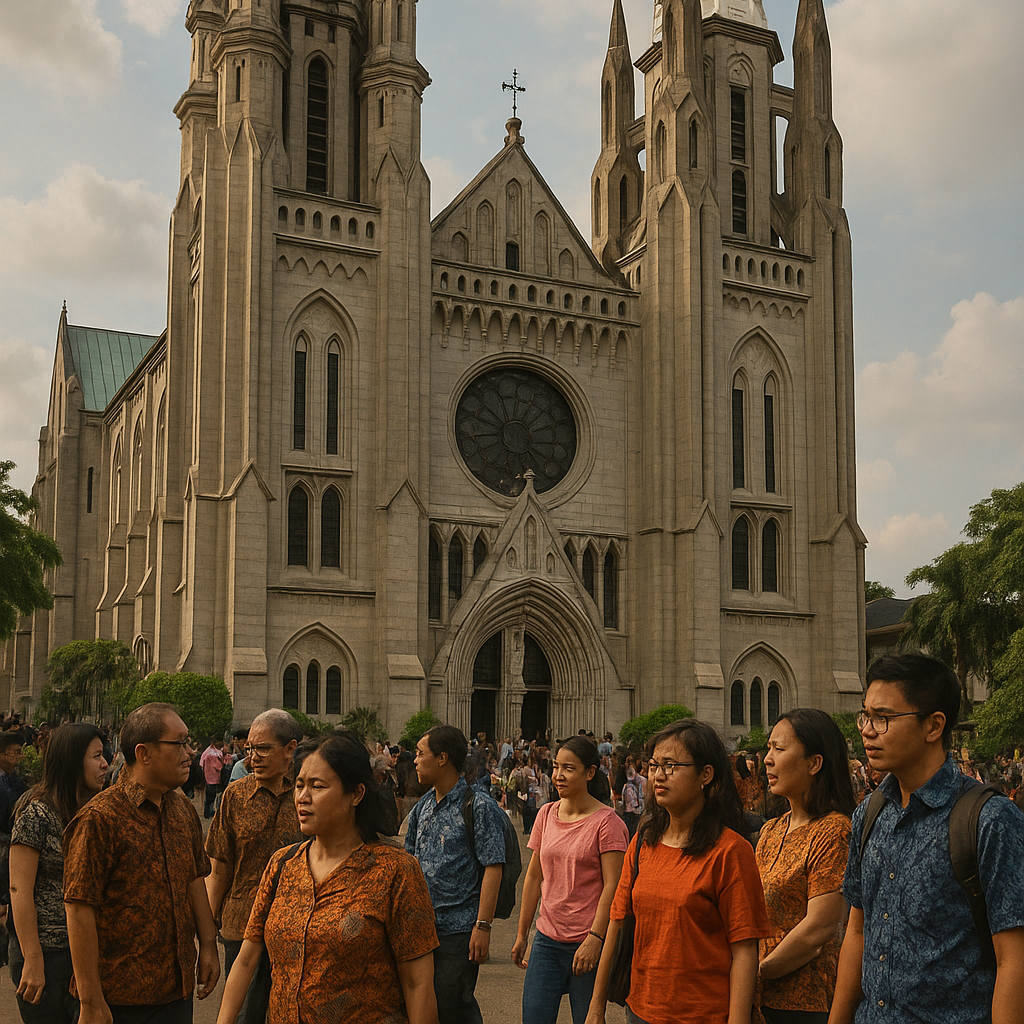The Role of Language in the Spread of the Gospel in Indonesia
theolingua.id – The Role of Language in the Spread of the Gospel in Indonesia has a long history that is influenced by various factors, one of which is language. The diversity of cultures and languages in the archipelago made the communication of Christian teachings a major challenge for missionaries and evangelists. Without a good understanding of the local language, the gospel message is difficult to accept by the community, so a special strategy is needed to effectively convey the teachings.
Language plays a crucial role in the evangelisation process, both through the translation of sacred texts and the use of local languages in oral communication. This article will discuss how language has been used in the spread of the gospel in Indonesia, including Bible translation, the use of local languages in evangelisation, as well as its impact on society. By understanding the importance of language in the spread of Christianity, we can see how these efforts have contributed to the development of Christianity in Indonesia.
Bible Translation into Local Languages
One of the most significant steps in the spread of the gospel in Indonesia was the translation of the Bible into local languages. The missionaries realised early on that in order for the gospel to be understood and accepted by the local people, the sacred texts had to be available in the languages they spoke on a daily basis. Without these translations, the message of the Bible would have been difficult for many people to understand, especially those who did not speak the foreign languages such as Dutch or English that were often used by missionaries at that time.
The process of translating the Bible is not an easy one, given the many languages and dialects that exist in Indonesia. Translators must understand not only the structure of the language, but also the local culture and meanings in order for the translated text to retain its original message. In this endeavour, figures such as Johann Gottlob Schwarz and Herman Neubronner van der Tuuk played an important role by translating the Bible into Batak, Javanese and Malay. With these translations, people could more easily understand and live the Christian teachings in their own cultural context.
The translations by missionaries were the first step that opened access for many people to understand the gospel in their own language. Missionaries such as Johann Gottlob Schwarz, Herman Neubronner van der Tuuk, and several others worked hard to translate the Bible into various regional languages such as Batak, Javanese, and Malay. This endeavour not only gave people access to read the Gospel in a language more familiar to them but also helped in enriching the vocabulary and development of local languages through the translation of sacred texts.
As the need for Bibles in various regional languages grows, the Indonesian Bible Institute (LAI) plays an important role in the translation and distribution process. Since its establishment, LAI has been instrumental in providing translations of the Bible in various regional languages in order to reach more people. This effort not only supports a better understanding of Christianity but also ensures that the Gospel can continue to be spread across the archipelago, even to previously hard-to-reach communities.
Dissemination Through Printing
In addition to translation, the spread of the Bible is made even more effective by advances in printing technology. With this technology, translated Bibles can be produced in large quantities and distributed to various regions. Printing technology allows for the spread of scripture on a much wider scale than the slower and more limited handwritten method.
Printing also provided advantages in terms of production costs and ease of access for the wider community. Whereas previously only a select group could own a copy of the Bible, with printing, many more people could own and read it privately. This contributed to the growth of local churches and accelerated the process of spreading the gospel to various parts of Indonesia, including remote areas that were previously difficult to reach.
Use of Local Language in Evangelism
In addition to Bible translation, language also plays a role in the evangelism methods used by missionaries and churches in Indonesia. Some of the approaches adopted include:
- Preaching in Local Languages: Local pastors and evangelists often use local languages in sermons and services to reach the congregation more effectively.
- Hymns in Local Languages: Music and hymns in local languages have been an effective means of introducing the gospel to communities.
- Teaching Christianity: Mission and Christian education schools often use local languages in their teaching to make it easier for learners to understand.
The Impact of Spreading the Gospel through Language
The use of language in the spread of the Gospel in Indonesia has brought various impacts to society, both in religious, social, and cultural aspects. Some of these are:
- Increased Understanding of Christianity: With the availability of Bibles in local languages, it is easier for people to understand Christianity and make it a part of their lives.
- Influence on Local Languages and Literature: Some local languages have developed through the translation of Christian texts, including the emergence of Christian literature in local languages.
- Formation of Local Christian Identity: The use of local languages in worship and ecclesiastical activities helps to build a distinctive Christian identity in various communities in Indonesia.
Conclusion
The role of language in the spread of the gospel in Indonesia is immense. Through the translation of the Bible into various local languages, the use of local languages in evangelism, and various culturally-based ecclesiastical activities, language has become the main bridge in introducing and strengthening Christianity in the archipelago. These efforts have not only helped people understand Christianity better, but also given them direct access to sacred texts in the languages they speak daily.
Going forward, translation efforts and the use of local languages in church services remain a relevant aspect in keeping the gospel understood and accepted by Indonesians. In addition, with the development of digital technology and social media, the use of local languages in the spread of the gospel is also increasingly diverse, including the translation of digital content, videos, and spiritual podcasts in local languages. This opens up greater opportunities to reach more people, including the younger generation who are more familiar with digital media.





